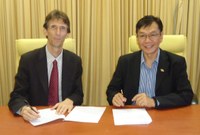 TWAS and OWSD – the Organization for Women in Science for the Developing World – have recently signed a pair of agreements with theUniversiti Putra Malaysia (UPM) that will provide a number of opportunities for postgraduate students and scientists from developing countries to spend time working in research laboratories in UPM.
TWAS and OWSD – the Organization for Women in Science for the Developing World – have recently signed a pair of agreements with theUniversiti Putra Malaysia (UPM) that will provide a number of opportunities for postgraduate students and scientists from developing countries to spend time working in research laboratories in UPM.
Under the agreement with TWAS, UPM becomes the 15th organization to join the TWAS South-South Fellowships programme. For its part, UPM has accepted to host postdoctoral scientists and visiting scholars for 6-12 months and 1-3 months, respectively. As with the other agreements under this scheme, TWAS will administer the application procedure and provide the expenses relating to the cost of travel.
In the case of the agreement with OWSD, this builds on a collaboration between OWSD and UPM that dates back to 2006. Since then UPM has been accepting young women postgraduate students under the OWSD Fellowship programme for young women scientists from sub-Saharan Africa and Least Developed Countries into its agricultural research programmes. Indeed, even before this initial formal arrangement, UPM had been hosting OWSD Fellowship awardees since 2002. To date, some 25 young women researchers have benefited from studying at UPM and 15 have graduated with higher degrees.
"When it comes to research, Malaysia is increasingly being recognized as a leading developing country, with several of its programmes also able to compete on the global stage," said Romain Murenzi, TWAS executive director. “Through this agreement, we are pleased to be building on our current collaborations with the Malaysian science community and to be able to offer scientists from developing countries other than Malaysia the opportunity to study at UPM, to make use of their top-class facilities, and to develop their links with researchers there.”
Likewise, OWSD president, Fang Xin, welcomed the new agreement with UPM. “OWSD has had a fruitful collaboration with UPM for several years. I am pleased to see this now expand and to include not just agricultural research, but all areas of the natural sciences. This really opens up more opportunities for young women scientists from sub-Saharan Africa and LDCs to get top-class training at a top-class institution.”
The call for applications to these two programmes will open in early 2013.
For more information, see TWAS South-South Fellowships and OWSD Fellowships.

